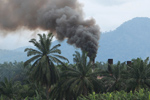
Harrison Ford in Tesso Nilo National Park, Sumatra. Photo by Zamzami of Mongabay-Indonesia.
Harrison Ford sparked a complaint from Indonesia’s top forest official after the actor asked a series of tough questions about ongoing rainforest destruction in the Southeast Asian nation, reports Indonesian state media.
Ford is in Indonesia filming a segment for Years of Living Dangerously, a Showtime documentary on climate change. The actor, known for his roles as Indiana Jones and Star Wars’ Hans Solo, is taking a first hand look at deforestation in Sumatra. He’s also interviewing several prominent officials, including Indonesian President Susilo Bambang Yudhoyono, on deforestation and forest conservation.
But it was Ford’s interview with Forestry Minister Zulkifli Hasan that made headlines in Indonesia today, when ANTARA News and other outlets reported that the official was upset over his encounter with the actor, who asked why Indonesia is failing to effectively protect its forests.
“I understand the American man just came here to see Tesso Nilo and wanted violators to be caught the same day,” ANTARA quoted Zulkifli as saying. “It was not easy to explain it to him. He was very emotional. His temper was high during the interview. I could understand his love for the fauna, the environment and the rain forests in Indonesia.”
“The time was very short. I was only given an opportunity to speak one or two words during the interview.”

Deforestation for palm oil in Indonesian Borneo. Photos by Rhett A. Butler.
In recent years Ford has been an outspoken advocate for rainforest protection. Given that Indonesia has one of the world’s highest deforestation rates due to logging, forest conversion for industrial plantations, and fires set for land-clearing, it is no surprise the actor is focusing on the country. Rainforest loss and peatlands degradation account for more than 80 percent of Indonesia’s greenhouse gas emissions, and a a substantial threat to endangered orangutans, tigers, rhinos, and elephants.
During his time in Southeast Asia, Ford is also meeting with Franky Widjaja, the chairman of Golden-Agri Resources (GAR), one of Indonesia’s largest palm oil producers. GAR notably broke ranks with the rest of the industry in 2011 when it established a no deforestation policy. The policy is now seen by an environmentalists as possible way forward for the palm oil sector, which today is the biggest driver of deforestation in the country.

Deforestation for palm oil in Borneo.
Jeff Horowitz, an associate producer Years of Living Dangerously, said the series won’t overlook some of the recent progress Indonesia has made in slowing deforestation.
“We chose to film our story in Indonesia because of the critical challenges they face in balancing the need to protect tropical forests with the need to secure economic development,” he told mongabay.com. “We appreciate the progress they’ve made so far – especially with regard to establishing several sustainable agricultural practices.”
Years of Living Dangerously is expected to air next April.
Video: Harrison Ford with conservationists in Indonesia’s Tesso Nilo National Park. Courtesy of Mongabay-Indonesia


Photo by Zamzami of Mongabay-Indonesia.
Related articles
Indonesia finally establishes REDD+ agency to tackle deforestation

(09/07/2013) Indonesia has finally established an agency to implement the country’s Reducing Emissions from Deforestation and Degradation (REDD+) program. The REDD+ agency, established by a decree from President Susilo Bambang Yudhoyono on Friday, is a ministry-level body that will coordinate a national REDD+ strategy between various ministries that influence and control land use policy across the sprawling archipelago.
Palm oil now biggest cause of deforestation in Indonesia

(09/03/2013) Conversion of forests for palm oil production now appears to be the single largest driver of deforestation in Indonesia, accounting for roughly a quarter of forest loss between 2009 and 2011, asserts a new Greenpeace report that accuses the sector’s main certification standard of failing to stop forest destruction. The report, titled Certifying Destruction, uses satellite imagery, government concession data, field investigations, and third party analysis to conclude that several recent and current members of the Roundtable on Sustainable Palm Oil (RSPO) — the industry’s chief eco-certification body — are continuing to buy or trade palm oil produced via the conversion of rainforests and carbon-dense peatlands in the Southeast Asian nation.
Billions lost to corruption in Indonesia’s forest sector, says report

(07/17/2013) Corruption and mismanagement in Indonesia’s forest sector have cost the government billions of dollars in losses in recent years, including over $7 billion in losses from 2007-2011, Human Rights Watch said in a report released yesterday. The report also blasted the country’s ‘green growth’ strategy, saying that despite recent reforms, Indonesia’s forestry policies as they are implemented today continue to allow widespread forest clearing and threaten the rights and livelihoods of forest-dependent communities.
Will Indonesia’s big REDD rainforest deal work?

(12/28/2010) Flying in a plane over the Indonesian half of the island of New Guinea, rainforest stretches like a sea of green, broken only by rugged mountain ranges and winding rivers. The broccoli-like canopy shows little sign of human influence. But as you near Jayapura, the provincial capital of Papua, the tree cover becomes patchier—a sign of logging—and red scars from mining appear before giving way to the monotonous dark green of oil palm plantations and finally grasslands and urban areas. The scene is not unique to Indonesian New Guinea; it has been repeated across the world’s largest archipelago for decades, partly a consequence of agricultural expansion by small farmers, but increasingly a product of extractive industries, especially the logging, plantation, and mining sectors. Papua, in fact, is Indonesia’s last frontier and therefore represents two diverging options for the country’s development path: continued deforestation and degradation of forests under a business-as-usual approach or a shift toward a fundamentally different and unproven model based on greater transparency and careful stewardship of its forest resources.